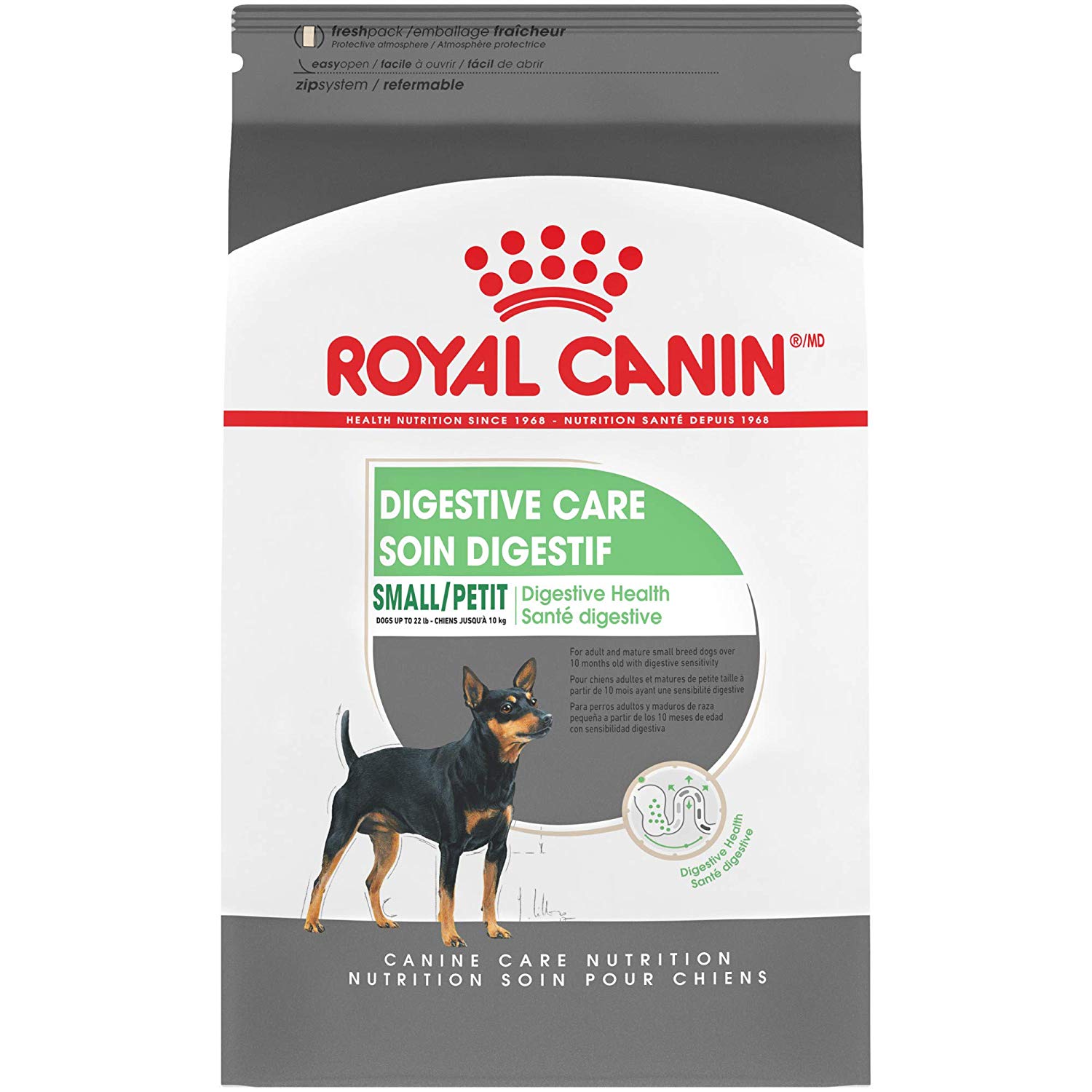Dogs are rather famous for eating anything and everything. While an occasional bout of barfing or other gastrointestinal distress is usually harmless, frequent issues could signal a sensitive stomach.
Here’s a closer look at five commercial dog food brands which we recommend for sensitive stomach issues:
Your dog’s food plays a major role in stomach health. Now let’s discuss why your dog’s stomach might be sensitive.
Frequently Asked Questions
What are the Signs My Dog Has a Sensitive Stomach?
Unfortunately, when dogs aren’t feeling well, they can’t tell us what’s wrong. We have to watch them closely for clues to their health. Common signs your dog might have a stomach problem include:
- Vomiting
- Diarrhea
- Constipation
- Increased gas
- Poor appetite
- Loose stool
- Anal gland issue
All dogs experience some of these symptoms from time to time. Watch for anything which is unusual compared to your dog’s normal behavior.
For example, some dogs are just plain gassy. That’s not necessarily a problem (medically, at least). But if your normally not-very-gassy dog is suddenly experiencing lots of gas, that’s a sign of turmoil in his digestive system.
If symptoms persist for more than a few days, consult with your vet. Also, check with your vet before switching your dog’s food. If food is behind the stomach problems, the switching process follows a specific process.
What Causes Sensitive Stomachs?
Stomach problems in dogs have a wide array of potential causes. Your dog might just have a temporary gastrointestinal issue which will go away on its own or after a quick trip to the vet. But other stomach problems can be caused by disease or other serious problems.
Common medical causes include:
- Inflammatory Bowel Disease (IBD)
- Colitis
- Pancreatitis
- Digestive Enzyme Deficiency
- Side Effect of Medication
You can’t diagnose these issues on your own. Instead, your dog will need to be examined by your vet. He or she can identify and then begin treatment of any underlying issues which might be causing your dog’s sensitive stomach.
Fortunately, most sensitive stomachs aren’t the result of a serious disease. Instead, stomach problems are often related to diet. If the vet can rule out illness, the next course of action is a change in diet.
What Ingredients are in Sensitive Stomach Foods?
Certain foods are not only easier for dogs to digest, but they also help relieve a variety of stomach-related symptoms.
First, avoid foods with high-fat content. Fat is difficult for dogs to digest. But they do need some amount of fat to aid digestion. Fat content of around 15% is ideal.
The main ingredient in the food should always be a protein. Dogs eat a diet consisting primarily of meat. The label on the food lists ingredients in order of relative quantity. Protein should be the first or second ingredient listed.
Not all proteins are equally digestible by individual dogs. For example, some dogs have difficulty digesting chicken but can handle beef or lamb without a problem. Switching to a food with a different protein can help relieve stomach distress.
Constipation is a common issue associated with sensitive stomachs. Treatment often includes an increase in both soluble and insoluble fiber. Foods with dried beet pulp, psyllium, and flaxseeds help maintain proper gut function.
Choose food with stomach-friendly carbohydrates such as:
- Brown rice
- Brewer’s rice
- Whole-grain oats
- Pearled Barley
Finally, choose food with high level of Omega-3 essential fatty acids. They’re anti-inflammatories which benefit multiple body systems.
How Do I Safely Switch a Dog’s Diet?
Dogs need time to adjust to new food. Never switch types of food quickly. Instead, you’ll slowly mix small portions of the new food in with the old. Typically, switching food is a 10-day process.
For the first two days, feed your dog a mixture of 10% new food and 90% old. Then increase the proportion of new food by 10% each day. For example, the mixture will be 50% new and 50% old food on the fifth days. On the tenth day, the food will be 100% new.
Slight stomach issues such as diarrhea and vomiting are normal during the 10-day transition period. In most cases, the issues will go away on their own as the dog adjusts to the new food. Contact your vet if adjustment problems continue for more than a week.
Can Food Allergies Cause Stomach Sensitivity?
Absolutely! Food allergies are another common reason why your dog might have stomach issues. Food allergies develop differently in dogs than people. While people are born with an allergy, most dogs develop their allergies over time.
Food allergies are easy to overlook. After all, your dog’s food hasn’t changed. But dogs develop allergies for foods they’ve eaten without issue for years.
Many dogs develop allergies to wheat, which is a common ingredient in less expensive dog food. Switch to food which uses a different source of carbohydrates such as rice, oats or potato.
Dogs also develop allergies to specific proteins. You’ll need to switch to a food with a different one.
For example, if your dog has eaten chicken-based food most of his life, switch to lamb or beef. This strategy is why you can find dog foods with exotic meats like kangaroo and venison; they’re designed for dogs with multiple allergies to more common proteins.
Dogs with sensitive stomachs benefit from dog food with limited ingredients. The simpler, the better. Try to choose food with one protein and one carbohydrate source.
Should I Add Fiber to My Dog’s Diet?
Sensitive stomachs often result in problems pooping. If your dog experiences loose stools, you might want to switch to a food with high fiber content.
Fiber can be soluble or insoluble. Soluble is easier to digest. Good sources of soluble fiber include:
- Beets
- Peas
- Carrots
- Flaxseed
- Beans
Remember, the main ingredient in dog food should be protein. It’s okay if the fiber is listed as the second, third or even fourth ingredient.
You can also add fiber to dry dog food. Adding fiber is useful if you’re currently giving your dog food which benefits him in other ways but doesn’t have a high fiber content.
Mix a spoonful of canned pumpkin into his dry food. Do this for every meal. You should notice improved regularity in about a week. An added benefit of pumpkin is that if your dog happens to snack on his poo, many dogs stop doing this when they eat canned pumpkin, they no longer like the taste of it.
Is Homemade Dog Food Healthier?
Generally, no. Homemade dog food often lacks important vitamins and nutrients. You’ll need a thorough understanding of canine nutrition if you want to make your dog’s food at home. Otherwise, the food – delicious as it may be – will fail to provide proper nutrition.
Besides, homemade food might not solve the issue. For example, if a dog has a sensitivity to certain ingredients like chicken or grain, they’ll upset his stomach regardless of whether they’re in commercial dog food or a homemade recipe.
When diagnosing a sensitive stomach, you’ll want to stick with commercial foods. The label on the food is a valuable resource because you can track the exact amount of every ingredient. Making your own food introduces too many variables during the diagnostic process.
1. Purina Pro Plan FOCUS
Purina’s Pro Plan features five different food formulas, with FOCUS made for dogs with sensitive stomachs. The main ingredient is salmon, an easily digestible protein.
It’s also worth noting is what’s not in the food – corn, soy, and wheat. Instead, carbohydrates are supplied by rice and oatmeal, both of which are gentle on digestive systems. Additionally, fish helps keep joints healthy. Aside from salmon, the same formula is available with lamb as the main protein.
Purina Pro Plan FOCUS Pros & Cons
Pros
- The simple formula is gentle on stomachs
- The main ingredient is salmon
- Contains no corn, soy or wheat
Cons
- Kibble turns to powder fairly easily
2. Hill’s Science Diet Adult Sensitive Stomach Dog Food
Hill’s Science offers a complete line of dog food for sensitive dog stomachs, with this specific formula suitable for most adult dogs. Slight variations of the formula are available for small dogs, older dogs, and others.
It’s nutritionally balanced with a blend of antioxidants, Vitamin C and Vitamin E. The top two ingredients are Brewer’s Rice and Chicken Meal. Omega-6 Fatty Acids not only supports the immune system but also help keep your dog’s coat full and shiny.
Hill’s Science Diet Pros & Cons
Pros
- Brewer’s Rice and Chicken Meal are easy to digest
- Add shine to coat
- Available for puppies, adults, seniors, and small dogs
- Nutritionally balanced by trusted brand Hill’s Science
Cons
- Protein is the second ingredient
- Some dogs don’t like the taste of rice
3. Purina ONE SmartBlend Natural Sensitive Systems Formula
Foods for sensitive stomachs should be simple, which is why the SmartBlend Sensitive Systems formula has a scientific reason for every ingredient included. No fillers allowed.
The main ingredient is salmon, an easily digestible source of nutrients. The protein helps promote healthy heart and stomach function. Plus, it contains glucosamine to help keep joints pain-free.
Dogs tend to love the taste. The crunchy kibble helps keep teeth clean by removing plaque and other buildups.
Purina ONE SmartBlend Pros & Cons
Pros
- Salmon is the number one ingredient
- Improved digestion within about 14 days
- Textured kibble cleans teeth and gums
- Includes glucosamine for joint health
Cons
- Can be easily confused with similar food which contains chicken
4. IAMS Proactive Grain Free Dog Food
Your dog’s sensitive stomach could be caused by a diet with too many grains. IAMS Proactive Grain-Free food is a safe and easy option if you’re trying to eliminate grains for your dog’s diet. Aside from containing no grains, the kibble also has no corn, wheat or soy.
So, what does it have? The first ingredient is chicken, following by peas, oatmeal and a wide range of vitamins and other nutrients. A blend of fiber and natural prebiotics helps improve digestion and soothe stomach pains.
IAMS Proactive Pros & Cons
Pros
- 100% free from grain, corn, wheat, and soy
- Helps diagnose grain allergies
- The first ingredient is chicken
- Natural fiber and prebiotics aid digestion
Cons
- Chicken is a common protein (not useful in diagnosing food allergies)
5. Royal Canin Nutrition Mini Dry Dog Food
Specifically formulated for small stomachs, this dry food from Royal Canin supports digestive function in dogs under 25 pounds. It’s also safe for puppies ten months or older.
The tiny kibble is easy to chew (and cleans teeth, too). Highly digestible chicken and brewer’s rice allow for smooth nutrient absorption. It also improves stool consistency while helping reduce constipation.
It’s tasty, too. Well, we don’t know that personally, but Royal Canin swears it’s been developed with picky eaters in mind. Sensitive stomachs often lead to a loss of appetite in dogs, so tasty food is a definite plus.
Royal Canin Pros & Cons
Pros
- Made for small dogs and puppies
- Helps improve stool consistency
- Tasty chicken and rice flavor
Cons
- Only available for small dogs
- Not suitable for puppies under ten months
Our Favorite Product
Our number one choice is the Purina Pro Plan FOCUS dog food. Every ingredient is carefully considered. The main ingredient, salmon, is easily digestible. It’s a small kibble which is easy to chew and swallow.
Plus, salmon is a fairly unique protein. As noted, sometimes protein allergies cause stomach sensitivity. Switching to a new food with a different protein can sometimes alleviate the allergy. Salmon is often a new type of protein for most dogs, which makes this food a good choice to switch to if you suspect a food allergy.
Aside from salmon, the food contains rice, oatmeal, and fish to promote healthy skin, hair and heart function.
But what we like most about FOCUS is its simple list of natural ingredients. To figure out why your dog is suffering from stomach problems, you need to eliminate as many foods from his diet as possible.
FOCUS keeps your dog’s diet wholesome, healthy and uncomplicated. The right food can work wonders on your dog’s sensitive stomach!











